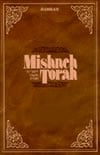Introduction to Hilchos Kiddush HaChodesh
It contains one positive commandment: To calculate, to determine and to establish the day on which each of the months of the year will begin. This mitzvah is explained in the [following] chapters
הלכות קדוש החדש
מצות עשה אחת והיא לחשב ולידע ולקבוע באי זה יום תחלת כל חדש מחדשי השנה. וביאור מצוה זו בפרקים אלו:
The months of the year are lunar months, as [implied by Numbers 28:14]: "... the burnt offering of the month when it is renewed,"1 and [Exodus 12:2]: "This month shall be for you the first of months."2 [Concerning this verse,] our Sages commented:3 The Holy One, blessed be He, showed Moses in the vision of prophecy an image of the moon and told him, "When you see the moon like this, sanctify it."
The years we follow are solar years, as [implied by Deuteronomy 16:1]: "Keep the month of spring."4
אחָדְשֵׁי הַשָּׁנָה הֵם חָדְשֵׁי הַלְּבָנָה שֶׁנֶּאֱמַר (במדבר כח יד) "עלַת חֹדֶשׁ בְּחָדְשׁוֹ" וְנֶאֱמַר (שמות יב ב) "הַחֹדֶשׁ הַזֶּה לָכֶם רֹאשׁ חֳדָשִׁים". כָּךְ אָמְרוּ חֲכָמִים הֶרְאָה לוֹ הַקָּדוֹשׁ בָּרוּךְ הוּא לְמשֶׁה בְּמַרְאֵה הַנְּבוּאָה דְּמוּת לְבָנָה וְאָמַר לוֹ כָּזֶה רְאֵה וְקַדֵּשׁ. וְהַשָּׁנִים שֶׁאָנוּ מְחַשְּׁבִין הֵם שְׁנֵי הַחַמָּה שֶׁנֶּאֱמַר (דברים טז א) "שָׁמוֹר אֶת חֹדֶשׁ הָאָבִיב":
How much longer is a solar year than a lunar year? Approximately eleven days.5 Therefore, [to correct the discrepancy between the lunar and the solar calendars,] when these additional days reach a sum of 30 - or slightly more, or slightly less - an additional month is added, causing the year to include thirteen months. This is called a full year.
[This is necessary,] because it is impossible to have a year with twelve months and an odd number of days, as [implied by Numbers 28:14]: "... of the months of the year." [On this verse, our Sages6 commented:] "You count the months of a year, but not the days of a year."
בוְכַמָּה יְתֵרָה שְׁנַת הַחַמָּה עַל שְׁנַת הַלְּבָנָה קָרוֹב מֵאַחַד עָשָׂר יוֹם. לְפִיכָךְ כְּשֶׁיִּתְקַבֵּץ מִן הַתּוֹסֶפֶת הַזֹּאת כְּמוֹ שְׁלֹשִׁים יוֹם אוֹ פָּחוֹת מְעַט אוֹ יוֹתֵר מְעַט מוֹסִיפִין חֹדֶשׁ אֶחָד וְעוֹשִׂין אוֹתָהּ הַשָּׁנָה שְׁלֹשָׁה עָשָׂר חֹדֶשׁ וְהִיא הַנִּקְרֵאת שָׁנָה מְעֻבֶּרֶת. שֶׁאִי אֶפְשָׁר לִהְיוֹת הַשָּׁנָה שְׁנֵים עָשָׂר חֹדֶשׁ וְכָךְ וְכָךְ יָמִים שֶׁנֶּאֱמַר (שמות יב ב) "לְחָדְשֵׁי הַשָּׁנָה". חֳדָשִׁים אַתָּה מוֹנֶה לְשָׁנָה וְאֵין אַתָּה מוֹנֶה יָמִים:
The moon becomes hidden and cannot be seen for approximately two days - or [slightly] less or slightly more - every month: approximately one day before its conjunction with the sun at the end of the month, and one day after its conjunction with the sun, [before] it is sighted in the west in the evening.7
The first night when the moon is sighted in the west after being hidden is the beginning of the month. Afterwards, 29 days are counted from that day. If the moon is sighted on the night of the thirtieth [day], the thirtieth day will be Rosh Chodesh [of the following month].
If it is not sighted, Rosh Chodesh will be on the thirty-first day, and the thirtieth day will be included in the previous month. There is no need [to sight] the moon on the thirty-first night; whether or not [the moon] is sighted [the new month begins that night]. For there are no lunar months longer than thirty days.
גהַלְּבָנָה נִסְתֶּרֶת בְּכָל חֹדֶשׁ וְאֵינָהּ נִרְאֵית כְּמוֹ שְׁנֵי יָמִים אוֹ פָּחוֹת אוֹ יוֹתֵר מְעַט. כְּמוֹ יוֹם אֶחָד קֹדֶם שֶׁתִּדְבַּק בַּשֶּׁמֶשׁ בְּסוֹף הַחֹדֶשׁ וּכְמוֹ יוֹם אֶחָד אַחַר שֶׁתִּדְבַּק בַּשֶּׁמֶשׁ וְתֵרָאֶה בַּמַּעֲרָב בָּעֶרֶב. וּבַלַּיִל שֶׁתֵּרָאֶה בַּמַּעֲרָב אַחַר שֶׁנִּסְתְּרָה הוּא תְּחִלַּת הַחֹדֶשׁ וּמוֹנִין מֵאוֹתוֹ הַיּוֹם תִּשְׁעָה וְעֶשְׂרִים יוֹם. וְאִם יֵרָאֶה הַיָּרֵחַ לֵיל שְׁלֹשִׁים יִהְיֶה יוֹם שְׁלֹשִׁים רֹאשׁ הַחֹדֶשׁ. וְאִם לֹא יֵרָאֶה יִהְיֶה רֹאשׁ הַחֹדֶשׁ יוֹם אֶחָד וּשְׁלֹשִׁים וְיִהְיֶה יוֹם שְׁלֹשִׁים מֵחֹדֶשׁ שֶׁעָבַר. וְאֵין נִזְקָקִין לַיָּרֵחַ בְּלֵיל אֶחָד וּשְׁלֹשִׁים בֵּין שֶׁנִּרְאָה בֵּין שֶׁלֹּא נִרְאָה. שֶׁאֵין לְךָ חֹדֶשׁ לְבָנָה יוֹתֵר עַל שְׁלֹשִׁים יוֹם:
When there are twenty-nine days in a month, [because] the moon was sighted on the thirtieth night, the month is called chaseir, ["lacking"]. If the moon is not sighted and the previous month has thirty days, the month is called me'ubar ["pregnant"] or malei ["full"].
When the moon is sighted on the thirtieth night, the moon is said to have been sighted at the appropriate time. When the moon is sighted on the thirty-first night, but not on the thirtieth night, the moon is described as having been seen on the night of its fullness.
דחֹדֶשׁ שֶׁיִּהְיֶה תִּשְׁעָה וְעֶשְׂרִים וְיֵרָאֶה יָרֵחַ בְּלֵיל שְׁלֹשִׁים נִקְרָא חֹדֶשׁ חָסֵר. וְאִם לֹא יֵרָאֶה הַיָּרֵחַ וְיִהְיֶה הַחֹדֶשׁ שֶׁעָבַר שְׁלֹשִׁים יוֹם נִקְרָא חֹדֶשׁ מְעֻבָּר וְנִקְרָא חֹדֶשׁ מָלֵא. וְיָרֵחַ שֶׁיֵּרָאֶה בְּלֵיל שְׁלֹשִׁים הוּא הַנִּקְרָא יָרֵחַ שֶׁנִּרְאָה בִּזְמַנּוֹ. וְאִם נִרְאָה בְּלֵיל אֶחָד וּשְׁלֹשִׁים וְלֹא נִרְאָה בְּלֵיל שְׁלֹשִׁים הוּא נִקְרָא יָרֵחַ שֶׁנִּרְאָה בְּלֵיל עִבּוּרוֹ:
Mishneh Torah (Moznaim)
Featuring a modern English translation and a commentary that presents a digest of the centuries of Torah scholarship which have been devoted to the study of the Mishneh Torah by Maimonides.
The [establishment of Rosh Chodesh] based on the sighting of the moon is not the province of every individual,8 as is the Sabbath [of the weekly cycle]. [In the latter instance,] everyone counts six days and rests on the seventh day.
[The sanctification of the new month,] by contrast, has been entrusted to the court.9 [The new month does not begin] until it has been sanctified by the court, and it is the day that they establish as Rosh Chodesh that is Rosh Chodesh. [This is implied by the verse,] "This month will be for you...," - i.e., the testimony [concerning the new month] will be entrusted to you.10
האֵין רְאִיַּת הַיָּרֵחַ מְסוּרָה לְכָל אָדָם כְּמוֹ שַׁבַּת בְּרֵאשִׁית שֶׁכָּל אֶחָד מוֹנֶה שִׁשָּׁה וְשׁוֹבֵת בַּשְּׁבִיעִי. אֶלָּא לְבֵית דִּין הַדָּבָר מָסוּר עַד שֶׁיְּקַדְּשׁוּהוּ בֵּית דִּין וְיִקְבְּעוּ אוֹתוֹ הַיּוֹם רֹאשׁ חֹדֶשׁ הוּא שֶׁיִּהְיֶה רֹאשׁ חֹדֶשׁ. שֶׁנֶּאֱמַר (שמות יב ב) "הַחֹדֶשׁ הַזֶּה לָכֶם" עֵדוּת זוֹ תִּהְיֶה מְסוּרָה לָכֶם:
The [High] Court would make calculations in a manner resembling11 the calculations of the astronomers, who know the location of the stars and their paths [in their orbits]. They would perform careful research to determine whether or not they would be able to sight the moon at the appropriate time - i.e., the thirtieth night.
If [the judges] determined that it was possible to sight [the moon], they would sit waiting for witnesses [to come and testify] throughout the entire thirtieth day. If witnesses came, and [the court] examined their testimony according to law, and verified the truth [of their statements], the court would sanctify [the new month]. If [the moon] was not sighted, and witnesses did not come,12 they would complete the thirtieth day, thus making the month full.
If, according to their calculations, [the judges] knew that it was impossible for the moon to be sighted, they would not sit [in session] on the thirtieth day, nor would they await [the arrival] of witnesses. If witnesses came, they would know that they are false witnesses, or that clouds appeared to them in a form resembling the moon, but it was not the real moon.
ובֵּית דִּין מְחַשְּׁבִין בְּחֶשְׁבּוֹנוֹת כְּדֶרֶךְ שֶׁמְּחַשְּׁבִים הָאִיצְטַגְנִינִים שֶׁיּוֹדְעִין מְקוֹמוֹת הַכּוֹכָבִים וּמַהֲלָכָם וְחוֹקְרִים וּמְדַקְדְּקִים עַד שֶׁיֵּדְעוּ אִם אֶפְשָׁר שֶׁיֵּרָאֶה הַיָּרֵחַ בִּזְמַנּוֹ שֶׁהוּא לֵיל שְׁלֹשִׁים אוֹ אִי אֶפְשָׁר. אִם יָדְעוּ שֶׁאֶפְשָׁר שֶׁיֵּרָאֶה יוֹשְׁבִין וּמְצַפִּין לָעֵדִים כָּל הַיּוֹם כֻּלּוֹ שֶׁהוּא יוֹם שְׁלֹשִׁים. אִם בָּאוּ עֵדִים וּדְרָשׁוּם וַחֲקָרוּם כַּהֲלָכָה וְנֶאֶמְנוּ דִּבְרֵיהֶם מְקַדְּשִׁין אוֹתוֹ. וְאִם לֹא נִרְאָה וְלֹא בָּאוּ עֵדִים מַשְׁלִימִין שְׁלֹשִׁים וְיִהְיֶה חֹדֶשׁ מְעֵבָּר. וְאִם יָדְעוּ בְּחֶשְׁבּוֹן שֶׁאִי אֶפְשָׁר שֶׁיֵּרָאֶה אֵין יוֹשְׁבִים יוֹם שְׁלֹשִׁים וְאֵין מְצַפִּין לָעֵדִים. וְאִם בָּאוּ עֵדִים יוֹדְעִין בְּוַדַּאי שֶׁהֵן עֵדֵי שֶׁקֶר אוֹ שֶׁנִּרְאֵית לָהֶם דְּמוּת לְבָנָה מִן הֶעָבִים וְאֵינָהּ הַלְּבָנָה הַוַּדָּאִית:
It is a positive commandment of the Torah13 for the court to calculate and determine whether or not the moon will be sighted, to examine witnesses until the moon can be sanctified, and to send forth [messengers] to inform the remainder of the people on which day Rosh Chodesh was observed,14 so that they will know the day [on which to celebrate] the festivals [as implied by Leviticus 23:2]: "that you will pronounce as days of holy convocation,"15 and [as implied by Exodus 13:10]: "And you shall observe this statute in its appointed season."16
זמִצְוַת עֲשֵׂה מִן הַתּוֹרָה עַל בֵּית דִּין שֶׁיְּחַשְּׁבוּ וְיֵדְעוּ אִם יֵרָאֶה הַיָּרֵחַ אוֹ לֹא יֵרָאֶה. וְשֶׁיִּדְרְשׁוּ אֶת הָעֵדִים עַד שֶׁיְּקַדְּשׁוּ אֶת הַחֹדֶשׁ. וְיִשְׁלְחוּ וְיוֹדִיעוּ שְׁאָר הָעָם בְּאֵי זֶה יוֹם הוּא רֹאשׁ חֹדֶשׁ כְּדֵי שֶׁיֵּדְעוּ בְּאֵי זֶה יוֹם הֵן הַמּוֹעֲדוֹת. שֶׁנֶּאֱמַר (ויקרא כג ב) "אֲשֶׁר תִּקְרְאוּ אֹתָם מִקְרָאֵי קֹדֶשׁ" וְנֶאֱמַר (שמות יג י) "וְשָׁמַרְתָּ אֶת הַחֻקָּה הַזֹּאת לְמוֹעֲדָהּ":
The calculations and the establishment of the months and the leap years is carried out only in Eretz Yisrael [as implied by Isaiah 2:3]: "For out of Zion will emerge the law, and the word of God [will emerge] from Jerusalem."17
If a great sage who received semichah18 in Eretz Yisrael left for the diaspora without leaving a colleague of equal stature in Eretz Yisrael, he may make calculations, establish the monthly calendar, and institute leap years in the diaspora.19If, however, it becomes known to him that a sage of his stature has arisen in Eretz Yisrael - and surely, if a sage of greater stature has arisen in Eretz Yisrael - it is forbidden for him to establish [the monthly calendar] and [institute] leap years in the diaspora.20 If he transgresses, and [attempts to structure the calendar in this manner], his actions are of no consequence.21
חאֵין מְחַשְּׁבִין וְקוֹבְעִין חֳדָשִׁים וּמְעַבְּרִין שָׁנִים אֶלָּא בְּאֶרֶץ יִשְׂרָאֵל שֶׁנֶּאֱמַר (ישעיה ב ג) "כִּי מִצִּיּוֹן תֵּצֵא תוֹרָה וּדְבַר ה' מִירוּשָׁלָיִם". וְאִם הָיָה אָדָם גָּדוֹל בְּחָכְמָה וְנִסְמַךְ בְּאֶרֶץ יִשְׂרָאֵל וְיָצָא לְחוּצָה לָאָרֶץ וְלֹא הִנִּיחַ בְּאֶרֶץ יִשְׂרָאֵל כְּמוֹתוֹ הֲרֵי זֶה מְחַשֵּׁב וְקוֹבֵעַ חֳדָשִׁים וּמְעַבֵּר שָׁנִים בְּחוּצָה לָאָרֶץ. וְאִם נוֹדַע לוֹ שֶׁנַּעֲשָׂה בְּאֶרֶץ יִשְׂרָאֵל אָדָם גָּדוֹל כְּמוֹתוֹ וְאֵין צָרִיךְ לוֹמַר גָּדוֹל מִמֶּנּוּ הֲרֵי זֶה אָסוּר לִקְבֹּעַ וּלְעַבֵּר בְּחוּצָה לָאָרֶץ וְאִם עָבַר וְקָבַע וְעִבֵּר לֹא עָשָׂה כְּלוּם:












